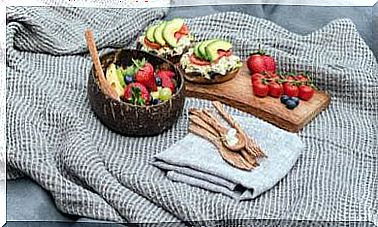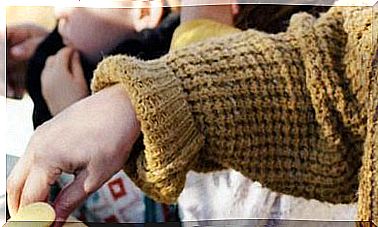How We Can Adapt To The Cold To Gain Health
The coldest days can be experienced as a stimulus for the organism and not as a risk. This tips guide can help you.

The body is prepared to cope with the drop in temperature and even to use it as a stimulus. By evolving, living beings, also human beings, have incorporated into their physiological functioning the external changes that occur regularly. The body uses them to regulate body heat and the nervous, hormonal and immune systems.
Therefore, if we stop relating to the characteristics of the season, we deprive the body of receiving stimuli that it appreciates. Maintaining health in winter consists of showing a vital attitude and adapting habits to the conditions of the season of the year. Here is a plan to adapt to the cold without fear.
Adapt your internal clock to increase vitality
People who are overwhelmed, even if they take all precautions, are more likely to be affected by an opportunistic virus. On the other hand, those who adapt willingly to the circumstances are more vital and find time and desire to enjoy life enjoy greater physical and mental resistance.
- To improve vitality and protect the immune system, it is advisable to go to bed early, get up early and go for a walk – or do some kind of physical exercise, be it running or practicing Tai Chi – for 20 minutes outdoors in order to make the most of the first hours of light. of the day, which helps to produce serotonin, a neurotransmitter associated with the sensation of well-being, and to regulate the production of melatonin, the hormone that regulates the rhythms of rest and activity, and whose production is influenced by exposure to light.
Practice physical exercise outdoors
The winter months are suitable to increase the practice of physical exercise. Do not be frightened by the cold. Activity in the body ignites the “inner boilers” and circulates endorphins, hormone-like substances that induce feelings of euphoria and well-being, and enhance the effectiveness of the immune system against viruses and bacteria that can cause respiratory infections.
- If possible, exercise should be carried out daily in the open air for a minimum of 20 minutes and with a certain intensity, that is, with cardiorespiratory effort. The concentration of viruses, bacteria and pollutants in indoor environments is more problematic than low outdoor temperatures.
- Brisk walking, running, or pedaling in the fresh air is invigorating and risk-free with a few simple steps. If the cold is really intense, you can wear several layers of clothing, as long as they do not cause perspiration above normal.
It is better to wear several thin garments than one thick one, because it takes advantage of the insulating effect of the “air chamber” between garment and garment.
- After exercising, it is best to rub your skin vigorously with a towel, take a hot shower, and put on warm clothing.
Warm up by resorting to the sauna or Turkish bath
In winter you want to warm up. It is a message that your body is sending to help you in your effort to maintain normal temperature. Each person can choose the way to warm up that they like best.
- The sauna, for example, is the favorite winter ritual of many people. The dry heat that floods the cabin, combined with the cold showers, improves the secretion of the bronchial mucosa, prevents colds and flu because it eliminates toxins from the body and improves the condition of the skin, muscles, circulation, in addition to eliminating virus.
Taking the sauna on Friday afternoon, after working hours, helps you connect with yourself.
- Other possibilities are the Turkish baths (of humid heat), or the hot bath with Epson salts and essential oils of ginger and eucalyptus. This bath can be safely prepared at home and is especially recommended for recovering from colds.
Enjoy the warmth of home
Another type of heat is the one that provides the intimacy of the home where more hours are spent in winter. In it, this protection, human warmth, even some isolation is sought. That is why it is convenient to find a way to make it more comforting.
- Take advantage of natural light. From the early hours of the day blinds and curtains must be opened to allow light to pass. The light keeps the internal clock from spinning out of control with days of fatigue and nights of insomnia.
- Find quiet moments. In the afternoon, if possible, it is necessary to disconnect from work and not abuse electricity, which can lengthen the working day too many hours and promote insomnia.
Lighting a few candles helps in the transition from day to night.
- Make the silence. Radios, televisions, stereos and the Internet often make one forget that within the four walls of the house you can enjoy silence as in few places.
- Humidify the environment. Many colds are due to the fact that the interior environments are too dry, since when the temperature rises, the relative humidity decreases. Also the sudden change from a hot inside to a cold outside can affect the body’s ability to defend itself. For this reason, if necessary, it is advisable to regulate the humidity with humidifiers and that the interior temperature does not exceed 20 ºC.
When they are poorly hydrated, the respiratory mucous membranes become the place for viruses and bacteria to nest.
- Aromatize your home. The rooms can be scented with specific essences. The lavender calms strong and relieves discomfort superficial emotions. The orange tree acts against melancholy and lack of appetite.
Sandalwood stimulates fantasy and verbena improves concentration.
- Put plants all over the house. They bring oxygen and moisture to dry environments, clean the air, and fill it with beneficial negative ions. In addition, they allow you to maintain contact with nature.
Adapt your diet to low temperatures
Diet is essential to adapt to climatic changes. The activity of the metabolism increases to maintain the body temperature, which makes you feel hungrier and eat more. Calorie requirements are considered to increase by 5% for every 10 degrees drop in temperature.
- It is advisable to consume more slow-absorbing carbohydrates, such as legumes and whole grains in general. They help keep you warm and feel bouncy all day.
- Although raw vegetables are always recommended for their contribution of vitamin C – known to be effective in preventing or reducing the intensity of colds and flu – traditional Chinese medicine recommends cooked roots and tubers (carrots, turnips, onions, potatoes, garlic or sweet potatoes).
In general, stews, purees, soups, creams and other hot and consistent dishes are recommended.
- You also have to slightly increase the proportion of fat. A supplementary winter ration is obtained with a couple of tablespoons of virgin olive oil and a daily handful of dried fruits (walnuts, almonds, pine nuts …).
- If autumn and spring are seasons that go well with cleansing diets, in winter it is preferable to nourish all systems and even accumulate some reserves.
- Since skin exposure to the sun is reduced in winter, it may be a good idea to increase your intake of vitamin D, which combats the symptoms of winter blues.
In addition, some experts recommend the intake of trace elements (copper, cobalt, manganese, silver, zinc, silicon …), since they are important for the functioning of the entire immune system. Foods rich in micronutrients are:
- The dried fruits.
- The seeds.
- Dried fruits.
- The seaweed.
- Brewer’s yeast.
- The wheat germ.
A good idea is to supplement the diet with ginger or cinnamon infusions.
Take supplements to boost your immune system
In cases of convalescence or a tendency to suffer a decrease in defenses, it may be convenient during the winter to take a supplement as a preventive measure. These are the most indicated, although you should always consult with the specialist before taking them:
- Selenium (200 micrograms a day). It increases the production of white blood cells that defend against infections and fights free radicals that damage cells.
- Zinc (15 mg per day). It stimulates immunity, favors the fight against bacteria and viruses and protects from the damage that toxins can produce.
- Vitamin C (100 mg a day). Indispensable for a good general health and preventive of colds and colds.
- Vitamin E (80 mg a day). It boosts the immune system, especially in older people, and it is a great antioxidant.
- Beta carotene (15 mg per day). It is transformed into vitamin A within the body and has antioxidant functions.
- Flavonoids (1 g per day). Also with antioxidant effects and favoring the beneficial action of vitamins and minerals that are ingested with food.
Take more rest breaks
In winter the body naturally tends to increase the hours of rest, but we live in such artificial conditions that we do not realize this important detail. It is part of winter functioning: muscles are much less irrigated than in any other season of the year and physical performance usually reaches its lowest levels.
The skin also receives less irrigation and the sweat glands rest more. On the other hand, the internal organs are heated and stimulated thanks to the greater flow of blood they receive.
To collaborate and reinforce with all these normal processes of the season, it is not a bad idea to sleep an hour more than usual, helping the body and mind to regenerate each night and the self-healing forces to be activated.
A winter, well lived, even if you have a cold or flu or it is very cold, can be a crucial stage to assimilate the experiences of the year and enjoy the next spring and the months that follow with health.









